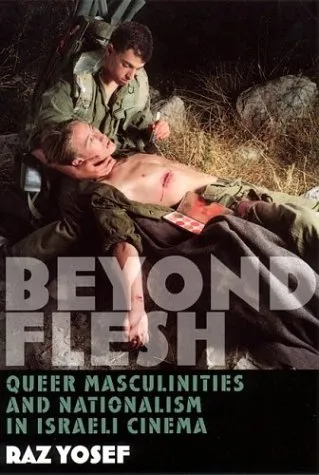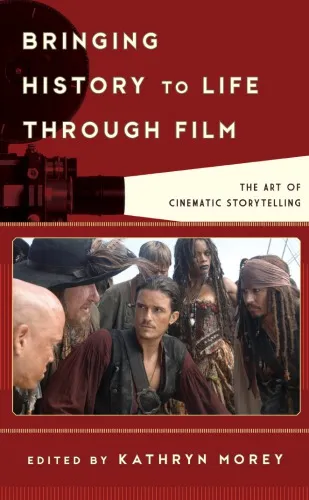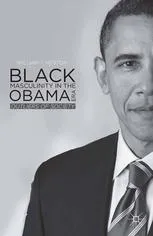Beyond Flesh: Queer Masculinities and Nationalism in Israeli Cinema
4.5
Reviews from our users

You Can Ask your questions from this book's AI after Login
Each download or ask from book AI costs 2 points. To earn more free points, please visit the Points Guide Page and complete some valuable actions.Related Refrences:
Introduction: Beyond Flesh - Exploring Queer Masculinities and Nationalism in Israeli Cinema
Welcome to Beyond Flesh: Queer Masculinities and Nationalism in Israeli Cinema, a groundbreaking examination of how Israeli cinema reflects, constructs, and challenges notions of masculinity, queerness, and nationalism. Written by Raz Yosef, this book delves into the nuanced ways in which cinematic portrayals of the male body and queer identities intersect with the socio-political narratives of Israel—a nation grappling with its own complex identity.
This academic yet accessible work sheds light on the interplay of gender, sexuality, and national politics within the framework of Israeli film. Offering critical perspectives on the evolving representations of male identity, Beyond Flesh positions cinema as a lens through which to analyze broader issues such as militarism, Zionism, and cultural memory. The book is a compelling contribution to queer, gender, and film studies, providing thought-provoking insights into the cultural tensions imprinted on the Israeli screen.
Detailed Summary
At its core, Beyond Flesh investigates how Israeli cinema participates in constructing the nation's identity through its portrayal of masculinity, particularly queer masculinities. Through critical analysis of iconic films, Raz Yosef explores how cinematic narratives reflect prevailing socio-political discourses and, conversely, how they serve as a platform to subvert traditional ideals of heroism, patriarchy, and heteronormativity.
The book is divided into thematic chapters that each tackle distinct yet interrelated topics. From depictions of soldiers' bodies in war films to the portrayal of homoeroticism in male friendships, the visual language of Israeli cinema is dissected to reveal its cultural and ideological underpinnings. Yosef examines films ranging from early Zionist propaganda works to postmodern cinematic texts, tracing shifts in the representation of masculinity and its alignment—or rebellion—against national narratives.
By analyzing films through a queer theoretical framework, Yosef interrogates how the male body is politicized and eroticized, becoming a site of both power and vulnerability. He also addresses how these films negotiate the tension between individual identity and collective national ethos, particularly in a militarized society where masculinity is often equated with strength, sacrifice, and dominance.
Ultimately, Beyond Flesh is not just an exploration of Israeli cinema but also a larger commentary on how nations construct their identities and marginalize those who deviate from the normative.
Key Takeaways
- Israeli cinema reflects the cultural, political, and social dynamics of its time, offering a mirror to the nation's evolving identity.
- The portrayal of masculinity in Israeli films often intersects with themes of militarism, Zionism, and collective memory.
- Queer masculinities in cinema challenge traditional patriarchal and nationalist frameworks, revealing spaces of resistance and subversion.
- The male body in Israeli cinema is both a symbol of national strength and a site of vulnerability, desire, and existential conflict.
- Cinema serves as a critical medium to interrogate cultural tensions, blurred identities, and repressed histories in Israeli society.
Famous Quotes from the Book
"The male body in Israeli cinema becomes a battleground where power, vulnerability, and identity intersect, mirroring the paradoxes of a nation in constant flux."
"To challenge the dominant narrative is to liberate the image, allowing it to breathe beyond the confines of myth and collective memory."
"Queer cinema is not merely a subversion of heterosexual norms but a reclamation of space and visibility in the nation's collective imagination."
Why This Book Matters
In a world increasingly attuned to questions of identity and representation, Beyond Flesh offers a timely and critical interrogation of how cinema shapes and reflects societal values. For Israeli society, where national survival often takes precedence over individual identity, examining the intersections of masculinity and nationalism is paramount.
This book is crucial for scholars of film studies, queer theory, gender studies, and Middle Eastern politics. By bringing into focus the often-overlooked queer perspectives in Israeli cinema, Raz Yosef challenges readers to rethink assumptions about heroism, power, and belonging. Moreover, the book raises pertinent questions about how art can both reinforce and resist dominant ideologies.
Above all, Beyond Flesh reminds us of the power of storytelling—offered through the medium of cinema—to disrupt, critique, and reimagine the world around us. It is not just a study of cinema but a call to engage with its potential to inspire change and visibility for marginalized voices.
Free Direct Download
You Can Download this book after Login
Accessing books through legal platforms and public libraries not only supports the rights of authors and publishers but also contributes to the sustainability of reading culture. Before downloading, please take a moment to consider these options.
Find this book on other platforms:
WorldCat helps you find books in libraries worldwide.
See ratings, reviews, and discussions on Goodreads.
Find and buy rare or used books on AbeBooks.





![The Ultimate iOS Interview Playbook: Conquer Swift, frameworks, design patterns, and app architecture [Team-IRA]](https://s3.refhub.ir/images/thumb/The_Ultimate_iOS_Interview_Playbook__Conquer__29925.webp)








